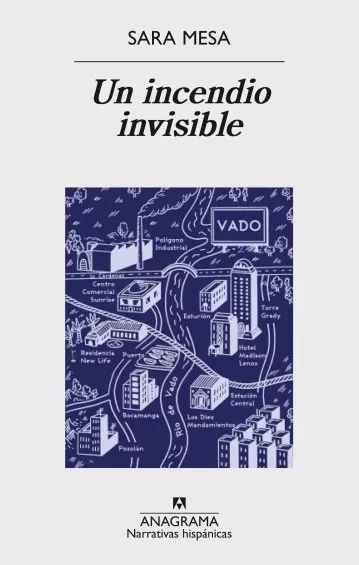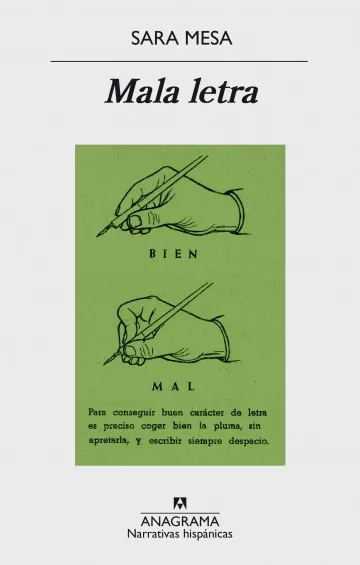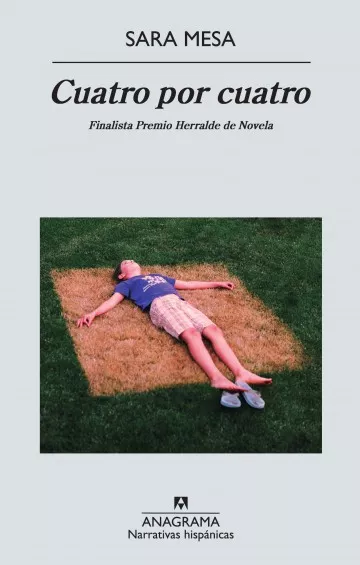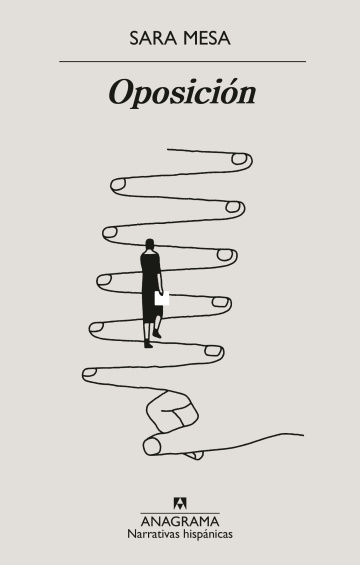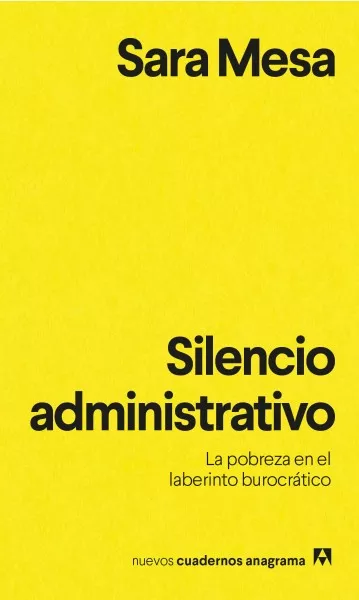| PAGES | 192 |
| SERIES | Narrativas hispánicas |
| PUBLICATION | 02/09/2020 |
El País - Babelia
Ara
El Correo Español - El Pueblo Vasco - Territorios de la Cultura
Ara
El Cultural
El País
El País - Babelia
La Vanguardia
The Objective - Further
El Mundo - El Cultural
El País - S Moda
Abc - Cultural
Diario de León - Filandón
Diario de Sevilla
El Periódico de Catalunya
Gara - Zazpika
Zenda
El Periódico Mediterráneo
Canarias 7
ABC (Sevilla)
Córdoba - Cuadernos del Sur
Diario de Navarra
Diario de Almería
El Periódico de Aragón
Diari de Tarragona
Diari de Tarragona - Encuentros
Segre - Dis
Navarra.com - Marea de libros (blog)
Pérgola
Zenda
Atlántico - La revista
El Mundo
Estandarte
Leer
Quimera
Hoy Extremadura
El Diario Vasco
Cultura joven
Diario del AltoAragón
Ideal de Almería
Clarín - Ñ (Argentina)
Revista Trasversales
Rockdelux
Última Hora
Clarín
AISGE
Llegir

SERIES:Narrativas hispánicas
Best Book of 2020 by El País, La Vanguardia, El Cultural and El Correo.
One of the Best Books of 2020 by El Mundo, Forbes España, ELLE España, La Nueva España Digital - LNE.es and more.
Ambitious, solid, risky: a novel about solitude and exclusion that is disturbing like Highsmith and sexual like Lawrence.
Nat, a young and inexperienced translator, has just moved to the small rural nucleus La Escapa. Her landlord will soon show his true colors and the conflicts surrounding the dilapidated rented house will become a real obsession for her. The rest of the area’s inhabitants will receive Nat with apparent normalcy, while deep down lie incomprehension and mutual strangeness. La Escapa will go on to acquire its own personality, oppressing and confusing, which will make Nat face not only her neighbors, but her own self and failures. Filled with silences and missteps, prejudices and implicit meanings, taboos and transgressions, Un amor confronts readers with the limits of their own morality in a novel in which, as though it were a Greek tragedy, the most unsuspected desires of its protagonists emerge while the community constructs a scapegoat.
«Sara Mesa's writing is mysterious and fascinating: the tips of her characters' fingers brush against the limit in environments of fierce false calm. Un amor is one of her best novels—tense and beautiful like a crouching bird» —Mariana Enríquez
«Un amor reaches an unprecedented force. Everything fits together: the expertise of the chosen narrative frame, the characters' subtle relationships. And, of course, a writing style that refines itself until it reaches a temperature—a coolness—that is pure joy for the reader, despite the constant apprehension in the plot. (...) The narrative model of Un amor is Coetzee: for its imprecise frame, for the level of exhaustion reached by Nat's character, for the preciseness of the style, and for the corrosion of moral concepts. A debt isn't what limits Sara Mesa as a writer, but rather the emulation of an extremely high narrative requirement. And Un amor is a demanding and precise novel» —Carlos Pardo, Babelia, El País
«What is fascinating about Sara Mesa is her ability to map the human condition through losers, the abuse of power, oppressive and isolated places, the slow and continuous degradation. That’s why her novels are so interesting: because they are always rough, bitter, sincere, dark, unpleasant and slow» —Ángeles López, La Razón.
“Nat is fleeing from something, perhaps from her own self, and she takes shelter in La Escapa so she can translate, obsessed by the ‘exact names’ of things. In this environment that is almost ominous (and at times close to gothic), Nat—much like other Sara Mesa characters—gets to know a new form of love: something ‘inexhaustible and addictive,’ where ‘stinging and desire, anxiety and vertigo’ all mix together…Mesa, who masterfully navigates free indirect speech, tells us everything we need to know about Nat, her neighbors, her dog, and her lover. While reading her I’ve thought of Camus, of Faulkner, of Disgrace’s Coetzee (whose pessimism aligns with Mesa’s at more than one point). I can’t and don’t want to tell you more about this incredible novel. But, if you still trust me at all, don’t miss it.” —Manuel Rodríguez Rivero, El País — Babelia
“Another author who is incapable of writing a bad book is Sara Mesa, who in Un amor (Anagrama), comes back with another one of her sieges of ‘the normal.’ The story of Natalia, a translator who decides to settle in a village, allows her to reflect on the ‘discomfort of happiness’ while bringing into question all the conventions about sex and feelings.” —Javier Rodríguez Marcos, El País — Babelia
“A new novel by Sara Mesa, Un amor, whose protagonist tries to start over from scratch in a village in the middle of nowhere, stumbling on the incomprehension and hostility of a community that will force the reader to rethink their conception of morality and be very wary at the time of judgment.” —Andrés Seoane, El Cultural
“You always, always, always have to pay attention to the strange/familiar scenarios that Sara Mesa lays out…Nat is the protagonist of the story, a young translator who decides to move by herself to a village and is confronted with a series of situations that generate fundamental questions that will make her oscillate between her prejudices, social taboos, and the tenuous limits of her own morality.” —Ana Laya, The Objective
"I had not previously known Sara Mesa, but after reading this book I have no intention of forgetting her name. "One Love" is a magnetizing, surprising and flawless novel, with a heroine who can only be described as human, all too human." — Haaretz
"Mesa strips the scene—the scenes—with tense writing that exposes the menace of everyday life without resorting to sociologisms and entertains readers by leaving them with the desire to know more at the end of the book." —Cristina Taglietti, La Lettura - Corriere della Sera
"Mesa's work has always aimed to reveal the matrices of power, especially in those places that many consider to be safe, like family. Her ability as a narrator lies in the clarity with which she probes the most intimate relationships, a sharp scalpel that recalls certain stories by Alice Munro and from which it's difficult to look away." — Laura Pezzino, TuttoLibri - La Stampa
"If a book can't be judged by its cover, perhaps it can be judged from its table of contents: La familia can surely lend itself well to that operation. The chapters have formidable titles that perfectly synthesize the laconic and surprising style that we are used to getting from Mesa, where there is always something mocking even in the most poetic or elusive images." —Veronica Raimo, D La Repubblica
"The author moves silently through its pages without ever passing judgment—on the contrary, she alternates between the light and dark parts of the characters while simultaneously managing to reveal all of the hypocrisies, the small violences, every deception, and the unspeakable secrets from this seemingly close and happy family." —Annalisa De Simone, Il Riformista
"A multifaceted novel that captivates us instantly." —Marta Cervino, Marie Claire
"A novel that sheds light on the darkest corners of the idealized image of the house and the family." —Internazionale
"The family is the world—a world created by Father and Mother, a world where the outside doesn't exist or is wrong. A world in which breaths are short, gazes are averted, desire and even imagination are nonexistent. These are the assumptions under which the events of La familia, Sara Mesa's gorgeous new novel, unfold." —Gianni Montieri, Esquire
"Deconstructing the family. Breaking it down into parts, then moving them in time and space. Making a novel out of them." —Tiziana Lo Porto, Il Venerdì di Repubblica
"Mesa is very talented at keeping the reader in a constant state of tension, the same one that the characters—more or less unknowing victims of an authoritarian father disguised as a gentleman—live in. This is an emblem of the different ways in which 'the family' can be a loving nest and serpent's nest, even within the same house and at the same time." —Letizia Bognanni, Rumore
"Sara Mesa depicts a fragile relationship full of contradictions. A relationship that doesn't hold up, embrace, support, and perhaps is very similar to the lives of human beings in its exceptionality—uncertain, sometimes inconclusive, sometimes with few happy endings, but made up of many beautiful moments." —Silvia Cannarsa, Il Libraio
| PAGES | 192 |
| SERIES | Narrativas hispánicas |
| PUBLICATION | 02/09/2020 |
El País - Babelia
Ara
El Correo Español - El Pueblo Vasco - Territorios de la Cultura
Ara
El Cultural
El País
El País - Babelia
La Vanguardia
The Objective - Further
El Mundo - El Cultural
El País - S Moda
Abc - Cultural
Diario de León - Filandón
Diario de Sevilla
El Periódico de Catalunya
Gara - Zazpika
Zenda
El Periódico Mediterráneo
Canarias 7
ABC (Sevilla)
Córdoba - Cuadernos del Sur
Diario de Navarra
Diario de Almería
El Periódico de Aragón
Diari de Tarragona
Diari de Tarragona - Encuentros
Segre - Dis
Navarra.com - Marea de libros (blog)
Pérgola
Zenda
Atlántico - La revista
El Mundo
Estandarte
Leer
Quimera
Hoy Extremadura
El Diario Vasco
Cultura joven
Diario del AltoAragón
Ideal de Almería
Clarín - Ñ (Argentina)
Revista Trasversales
Rockdelux
Última Hora
Clarín
AISGE
Llegir
TRANSLATION RIGHTS SALES
- France (Grasset)
- Germany (Wagenbach)
- Greece (Ikaros)
- The Netherlands (Wereldbibliotheek)
- USA (Open Letter)
- Portugal (Relógio D'Água)
- Italy (La Nuova Frontiera)
- Saudi Arabia (Dar Athar)
- Denmark (Skjodt)
- China (The Writer's Publishing House)
- Brazil (Autentica)
- Poland (Glowbook)
- Israel (Locus)
- UK (Peirene Press)
- Turkey (Sel Yayincilik)
- Japan (Hakusuisha)
- Romania (Humanitas)
- Croatia (Oceanmore)


Sara Mesa (Madrid, 1976) has lived in Seville since childhood. She has published the novels Un incendio invisible (Premio Málaga de Novela) and El trepanador de cerebros, and the story collections No es fácil ser verde and La sobriedad del galápago. With her poetry collection Este jilguero she won the Premio Nacional de Poesía Miguel Hernández en 2007. With Anagrama she has published Cuatro por cuatro: «An original novel full of talent» (Pablo Martínez Zarracina, Bilbao); «A stripped-down language, using brief and forceful syntax, which often focuses on a suggestion or a detail as expressive as it is devastating» (Ana Rodríguez Fischer, El País); «A very good novel» (Eva Muñoz, La Vanguardia); «A new narrative voice emerges which is destined to lead to important things in Spanish fiction of the XXIst Century» (Ángel Basanta, El Mundo); «A cold and naked novel, full of powerful images that make the reader uneasy as they draw him in» (Marta Sanz, El Confidencial); «A disquieting invitation to look with new eyes at isolated educational environments» (María Bengoa, El Correo Español); «What can I say about a story in which everything works?... A new author that will surprise us further in future» (Sergio Sancor, Libros y literatura); «Sara Mesa. Don’t forget that name. The finalist for the XXXth Premio Herralde de Novela. Read it. Share it. Talk about it. Open the book and begin. You won’t be able to put it down.» (Uxue, Un libro al día).
Photo: © Sonia Fraga




